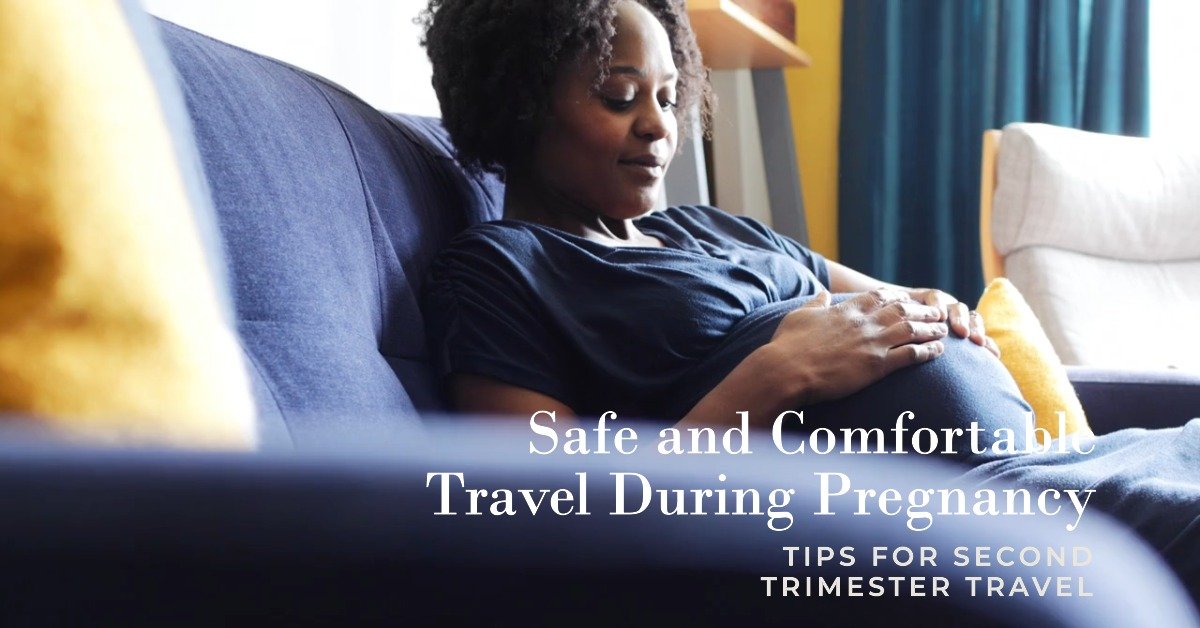Traveling during the second trimester, typically between weeks 14 and 28, is considered to be the safest and most comfortable time for pregnant women to embark on a journey. During this stage, morning sickness is likely to subside, energy levels increase, and the risk of complications such as miscarriage and preterm labor is relatively low. However, it’s crucial to prioritize safety and take necessary precautions to ensure a smooth and enjoyable trip. In this article, we will explore the topic of safe travel during the second trimester, offering valuable insights and tips for pregnant women who wish to embark on a journey while enjoying peace of mind. Whether you’re planning a vacation or have a work-related trip, these guidelines will help you make informed decisions and travel safely during this stage of pregnancy.
Table of Contents
Benefits of Traveling During the Second Trimester
The second trimester is often referred to as the “golden period” of pregnancy. It’s characterized by fewer pregnancy-related discomforts and offers expectant mothers a window of opportunity to explore and travel. Here are some benefits of traveling during this time:
- Increased energy levels: Many women experience a boost in energy during the second trimester, allowing them to engage in various activities while on the go.
- Reduced morning sickness: Nausea and vomiting, commonly associated with early pregnancy, tend to diminish during the second trimester, making travel more comfortable.
- Better comfort and mobility: With a growing belly, traveling becomes more cumbersome in the later stages of pregnancy. The second trimester provides a balance between mobility and physical comfort.
- Enhanced emotional well-being: A change of scenery and a break from daily routines can have a positive impact on an expectant mother’s mental health and overall well-being.
Consult Your Healthcare Provider
Before planning any travel, it’s crucial to consult your healthcare provider. They will evaluate your pregnancy and medical history to ensure that you are in good health and medically fit to travel. Your healthcare provider may provide specific guidelines and recommendations based on your individual circumstances.
Choosing the Right Mode of Transportation
When considering transportation options, choose the mode that offers the most comfort, convenience, and safety. Here are some factors to consider:
- Air travel: If you’re planning to travel by air, check with the airline regarding their policies for pregnant passengers. Most airlines allow travel up to the 36th week of pregnancy but may require a medical certificate during the later stages.
- Road travel: If traveling by car, plan for frequent rest breaks to stretch your legs, use restroom facilities, and ensure proper hydration.
- Train or bus travel: These modes of transportation offer more legroom and mobility compared to air travel and can be comfortable options for shorter distances.
Packing Essentials for Safe Travel
Packing the right essentials is crucial for a safe and comfortable journey. Consider including the following items in your travel bag:
- Medical documents: Carry a copy of your prenatal medical records, including your healthcare provider’s contact information.
- Comfortable clothing: Pack loose-fitting, breathable clothes that allow freedom of movement and accommodate your changing body.
- Snacks and water: Keep nutritious snacks and plenty of water on hand to stay hydrated and maintain energy levels during the journey.
- Medications: If you have any prescribed medications, ensure you have an adequate supply for the duration of your trip.
- Supportive pillow or cushion: Bring a pillow or cushion to support your back and provide additional comfort during long periods of sitting or resting.
- Comfortable shoes: Opt for supportive, well-fitting shoes to prevent foot swelling and provide stability while walking.
Staying Hydrated and Eating Right
Staying hydrated and maintaining a healthy diet are essential during pregnancy, especially while traveling. Follow these tips:
- Drink plenty of water: Proper hydration helps prevent dehydration, reduces the risk of swelling, and supports overall well-being.
- Eat nutritious meals and snacks: Choose healthy, balanced meals that include fruits, vegetables, whole grains, and protein-rich foods. Pack healthy snacks to avoid relying on fast food or unhealthy options while traveling.
Dressing Comfortably and Wearing Supportive Shoes
Comfortable clothing and supportive footwear are vital for a pleasant travel experience. Consider these suggestions:
- Wear loose-fitting, breathable clothing: Opt for clothes made from natural fibers that allow air circulation and prevent overheating.
- Layer your clothing: This allows you to adjust your attire based on temperature changes during your journey.
- Choose supportive shoes: Opt for comfortable shoes with proper arch support to prevent foot discomfort and swelling.
Practicing Good Posture and Stretching
Maintaining good posture and engaging in regular stretching exercises can alleviate discomfort and reduce the risk of muscle strain. Here’s what you can do:
- Sit with proper posture: Sit upright with your back supported and shoulders relaxed. Use a cushion or pillow for added support.
- Perform gentle stretching exercises: Regularly stretch your legs, arms, and back to promote blood circulation and relieve muscle tension.
Prioritizing Rest and Sleep
Adequate rest and sleep are essential for pregnant women, especially while traveling. Follow these recommendations:
- Take breaks and rest periods: Schedule regular breaks during your journey to rest and stretch your legs.
- Ensure comfortable sleeping arrangements: If you’re staying overnight, choose accommodations that provide a comfortable bed and a quiet environment for a good night’s sleep.
Avoiding Excessive Physical Exertion
While it’s important to stay active during pregnancy, avoid excessive physical exertion while traveling. Here’s what you can do:
- Pace yourself: Plan activities and sightseeing at a comfortable pace, allowing for breaks and rest periods.
- Seek assistance when needed: Don’t hesitate to ask for help or use mobility aids, such as wheelchairs or ramps, when necessary.
Managing Nausea and Motion Sickness
Nausea and motion sickness can be common discomforts during pregnancy. Consider these strategies:
- Eat light meals: Opt for smaller, frequent meals to prevent feelings of nausea and minimize the risk of motion sickness.
- Choose a suitable seat: If traveling by car, sit in the front seat or choose a seat facing the direction of travel to reduce motion sickness symptoms.
Ensuring Access to Medical Care
When traveling during pregnancy, it’s essential to be prepared and have access to medical care if needed. Consider the following:
- Research healthcare facilities at your destination: Identify hospitals or clinics in the area you’re traveling to in case of any medical emergencies.
- Carry important medical information: Keep a note of any allergies, medical conditions, and emergency contacts readily available.
Being Mindful of Surroundings and Safety
Maintaining awareness of your surroundings and prioritizing safety is crucial while traveling. Follow these safety tips:
- Be cautious of your environment: Avoid crowded or unsafe areas and use well-lit and well-traveled routes.
- Protect yourself from the sun: Apply sunscreen, wear a wide-brimmed hat, and use sunglasses to protect yourself from harmful UV rays.
Dealing with Potential Travel Disruptions
Travel disruptions can happen unexpectedly. Prepare for potential disruptions with these suggestions:
- Travel insurance: Consider purchasing travel insurance that covers trip cancellations, delays, or unforeseen circumstances.
- Have a contingency plan: Keep important contact numbers, alternative routes, and backup accommodation options in case of unexpected changes to your travel plans.
Conclusion
Traveling during the second trimester can be a rewarding experience for expectant mothers. By following these guidelines and taking necessary precautions, you can ensure a safe and enjoyable journey while prioritizing your well-being and the health of your baby. Remember to consult your healthcare provider before making any travel plans and listen to your body’s needs throughout the trip.
FAQs
-
Can I travel during the second trimester if I have a high-risk pregnancy?
It’s best to consult your healthcare provider before making any travel plans, especially if you have a high-risk pregnancy. They can provide personalized advice based on your specific situation.
-
Are there any restrictions on air travel during the second trimester?
Most airlines allow pregnant passengers to travel up to the 36th week of pregnancy, but policies may vary. Check with the airline beforehand and consider obtaining a medical certificate if required.
-
Should I bring any medications with me while traveling?
Ensure you have an adequate supply of any prescribed medications you are taking. Pack them in your carry-on luggage for easy access.
-
How can I manage swelling during long journeys?
To minimize swelling, drink plenty of water, elevate your legs whenever possible, and take regular breaks to walk and stretch.
-
What should I do if I feel unwell during my trip?
If you feel unwell or experience any concerning symptoms, seek medical attention immediately. Refer to your medical records for important contact information of your healthcare provider or local medical facilities.
Remember, each travel adventure is an opportunity for personal growth, connection, and celebration. Cherish the experiences, embrace the world, and savor the joys of pregnancy while exploring the wonders that await you. Create lasting memories, immerse yourself in new cultures, and savor the adventure while keeping your and your baby’s safety at the forefront.
Click here to read more such articles and embark on a journey of discovery, empowerment, and safe travel during this magical chapter of your life.
Wishing you safe travels, unforgettable moments, and a pregnancy journey filled with wonder and delight. Bon voyage and happy reading!













Leave a Reply
View Comments